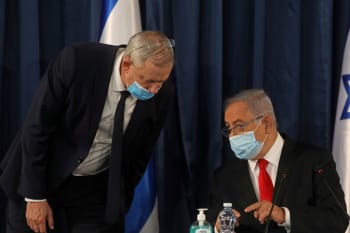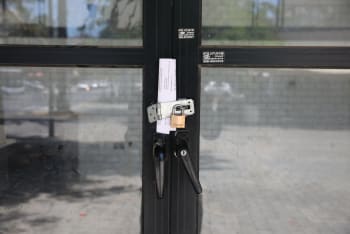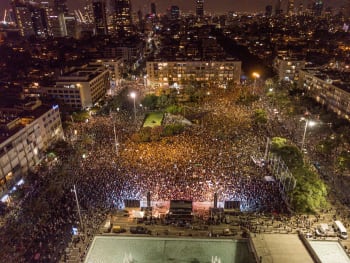Finance Minister Yisrael Katz had hoped Friday for a quiet Shabbat, after a stormy week. But Prime Minister Benjamin Netanyahu had other plans: He called in Katz that afternoon to meet with representatives of self-employed people and various organizations in a vain attempt to head off Saturday’s night demonstration in Tel Aviv against the government’s coronavirus economic policies.
On Wednesday, Netanyahu and Katz had unveiled a new, 90 billion shekel ($26.1 billion) aid plan for people and businesses hurt by the pandemic. But it didn’t stop the protests. Israelis are angry, traumatized and anxious about the future, while dealing with a new surge in infections. They don’t trust the government, and the two main partners in the so-called coronavirus unity government – Netanyahu and Benny Gantz, the alternate prime minister and defense minister – don’t trust each other.
After the meeting, Katz concluded that the protest planned for Saturday evening could not be stopped. Israelis are fed up with unmet promises of financial aid, the criteria for which kept deserving people from qualifying, and with confusing and contradictory directives.
In an interview with TheMarker, Katz said the interim government’s assumption, that the pandemic would recede quickly and Israel would return to normal by the end of June, was wrong.
After seeing the illness figures a week ago, he said, “I realized the virus will be with us until we find an effective vaccine. My estimate is that by next June they will find a vaccine. Therefore I devised a long-term plan, because it’s clear that many business sectors, like aviation, tourism and events halls, haven’t resumed normal activity. The prime minister adopted my plan and its underlying economic scenario, namely that the coronavirus will be with us for another year.”
The prime minister has spoken about an “accordion model” of opening and closing businesses based on contagion data. Is that realistic?
“No sector can operate like an accordion, which is why I firmly opposed closing restaurants. Sitting outdoors at a restaurant is low risk and sitting inside one is a moderate risk, and we’re saying that we won’t lose businesses like that, just high-risk businesses like events halls and pubs. The health care system can accurately predict contagion, but it doesn’t know what sectors need to be ordered closed or to reduce their activities.”
- Netanyahu Can’t Divert Attention From the Coronavirus Protests. It Could Be the Beginning of His End
- Israel’s Emergency Government Makes Light of a Deadly Serious Pandemic
- Israel’s Coronavirus Strategy Is About Making Life Bearable Until a Vaccine Is Found
Was there an overreaction – first, a total lockdown that hurt the economy and then a message from the prime minister to go out and have a good time?
“No one knows how the virus behaves and no one knows what will happen next. Even when I talk about the coming year, we don’t know what will be. Optimism is legitimate.”
Who’s to blame
So who does the failure belong to?
“I’m not singling out anyone – we’re one government. The health care system needed to create an effective monitoring system. As to enforcement of the rules, it was not being done. So I took it upon myself the issue of the local authorities and employing their thousands of inspectors to enforce Purple Tag [coronavirus regulations applied to businesses] and other rules. They know how to enforce rules and close businesses that violate rules.”

Benjamin Netanyahu speaks with Benny Gantz during the weekly cabinet meeting in Jerusalem, June 7, 2020. Credit: Menahem Kahana/Pool via REUTERS
Reopening events halls was a mistake?
“The Purple Tag they were given was faulty. It permitted 250 guests and allowed dancing, but weddings and celebrations are multigenerational events and they increase the risk of infection. Events hall owners circumvented the rules. … I sat down with owners and tried to figure out if there was a way to hold events if the rules were enforced. They told me it’s impossible without dancing and only 250 people.
In other words, place the onus on businesses and not on the public?
“The most effective way is what happened with the mall owners – they know what the rules are and we demanded that they honor them and, if not, their malls would be closed and they would get no compensation.
“We need to reduce the number of people who are infected. We’re going to do that without closing down the economy, that’s the lesson we learned from the first time. I’m an activist finance minister, and I have to prevent a complete lockdown. If we tell a business you have to close, we’ll say it’s only for two weeks and you don’t need to fire employees. People need hope and motivation.”
The plan you unveiled Thursday pays unemployment benefits until June 2021 or as long as the jobless rate remains above 10%. The Bank of Israel says unemployment will fall to 9% by the end of this year. That means that in practice the extended benefits will only run to the end of 2020 and not for another year.
“We said that the moment unemployment falls before 10% we would rescind the [coronavirus] rules and return to normal rules in order to create an incentive for people to seek work. My assumption is that people don’t want to be unemployed, but we need to give them a social safety net. We can’t behave right now according to the old rules.”
The prime minister was very concerned about the protest, but couldn’t it be that the protests are a natural response to the government’s not being truthful with the public? Why not tell the truth, that the government can’t make things go back to the way they were?
“I haven’t promised the impossible, but what’s been promised must be given. It’s clear that many have been struggling. Those who have returned to work have it best, but those who haven’t need an alternative solution for the next year. Those who need it will get assistance, but it won’t amount to 100% [of their income]. It would cost us hundreds of billions of shekels to compensate everyone for all their losses. I’m aiming to keep businesses open, with the idea of enabling those that can to continue operating. My goal is that people should be able to work and that they won’t need aid.”
Your meeting with the prime minister Friday was aimed at neutralizing the protests?
“Part of our goal was to calm fears and present data, which is why treasury officials attended. Let’s say we had hoped it would stop the scheduled demonstration, but to prevent a demonstration over what has already happened, when so much [anger] has accumulated, that’s hard.”
The program you presented Thursday does nothing to create new jobs, which would be the best kind of economic aid. Why not?
“We allocated 5 billion shekels for accelerating the economy, for welfare and vocational retraining. That’s a lot of money.”

A padlock on the door of a business in Holon, June 2020.Credit: Ofer Vaknin
Where’s the growth engine component? How many jobs will it create?
“My program comprises three pillars: emergency aid based on metrics and returning people to work; a minimalist budget without painful measures or higher taxes; and the Economic Arrangements Bill [supplementary legislation to the national budget], which is a real revolution. The law reflects my character and vision. I sat with the different treasury divisions and discussed a lot of ideas that converged into four colors: green for ideas and undertakings that are ready to move forward; yellow for ideas I support in principle but it’s not yet clear whether they can be undertaken; white for ideas that need to be given more thought, like raising the retirement age for women. I can’t address that until I’ve heard from women who will be affected by it; and red for ideas that aren’t going to happen and are going back into the drawers, such as reducing the minimum wage to help increase employment.”
Public sector cutbacks
If private sector employers realize they can make do with fewer employees, doesn’t the same apply to the public sector?
“We’ve had discussions in the treasury about that question. The budget division wanted to act aggressively and the wages division was more pragmatic. The budget division believes that we could save 40 billion shekels a year with efficiency steps. I drew a line: We will not sign any new wage agreements over the next two years. That is, there will be no pay increases. There won’t be any layoffs because of the high unemployment rate. But there will be cutbacks, for example, no contributions to advanced-training funds (kranot hishtalmut) for civil servants earning 15,000 shekels a month or more.
“During the lockdown there was more business flexibility than usual, which the Histadut labor federation agreed to, and I’d like to maintain this because it adds a lot to productivity.”
The numbers coming out of the government are contradictory and undermine public trust. For instance, the Finance Ministry said the new program will cost 6.5% of gross domestic product, that is 90 billion shekels, while Prof. Avi Simhon, the chairman of the National Economic Council, said the “new money” involved was just 20 billion shekels. What is the real cost?
“The cost of the program is 60 billion shekels from the budget and another 30 billion shekels in loan guarantees.”
That’s in addition to the 100 billion that had been allocated until now? Or have you counted each shekel two or three times?
“That’s additional money. No question. I’m working to fix elements of the previous programs, too, but it’s a new and additional program. It’s my plan, not Avi Simhon’s. I stand behind all the numbers and checked them. I have no reason to wave around the program’s costs, it’s not a flag. I look at our real needs and see where they take us. The program will be adjusted from time to time, but this won’t be a matter of changing it by a shekel.”
If so, we are talking about huge spending, a total of 190 billion shekels, or about half the state budget for one year. How are you going to finance it and when will the public have to pay for it with higher taxes?

A protest against the government’s handling of the economic crisis caused by the coronavirus pandemic, in Tel Aviv, July 11, 2020.Credit: Tomer Appelbaum
“Our ability to raise money cheaply right now is excellent. That’s what [former Bank of Israel Governor Stanley Fischer and current governor Amir Yaron] told Netanyahu last week. Accountant General Rony Hizkiyahu, who’s responsible for raising the money, is a little more conservative. The program will increase the budget deficit, but other countries are going in the same direction.”
Where do you stand in the standoff between Netanyahu, who wants a one-year budget, and Alternate Prime Minister Benny Gatz who is demanding a two-year budget, as the coalition agreement calls for?
“Without commenting on any political agreements, I explained to Gantz that I want a budget and the Arrangements Bill passed immediately. That will act as a growth engine. That’s what will enable the economy to recover. Speed is important. To prepare for 2021 requires a different perspective. Right now, we need a budget so we can undertake the spending we committed to but couldn’t meet because are still using the 2019 budget.”
Netanyahu instructed MK Nir Barkat to draft an economic program while you were developing your own plan. Do you feel you’re being set up to take the blame for failed economic policies?
“I could have stayed on as foreign minister. If there hadn’t been a crisis, I doubt I would have wanted to be finance minister. I chose to be finance minister because of the enormous challenge. We’re facing the most serious economic situation in decades. I entered public life in order to have an impact. I’m confident that I have the ability to lead the way together with the prime minister, the other ministers, Knesset members and the different organizations. I’m trying, and I believe I am succeeding, in ignoring all the pointless sideshows.”
And the Barkat plan?
“I am managing alone, I don’t need any help. I hope to have the program approved this week … with the approval of the prime minister and Gantz. There’s not a single clause in the Barkat program that will be on the agenda. These are facts.”
Netanyahu first
How do you see Netanyahu’s concerns about his personal welfare – the tax benefits and so forth – in the middle of an economic crisis? That doesn’t undermine public confidence?
“I don’t want to comment on this again. As for public trust, we clearly have a serious crisis of confidence on the part of wage earners and the self-employed in light of how things were managed at the start of the crisis, due to promises that weren’t kept and the gap between promises and execution. I told the prime minister that when we appear in front of the public, we’re going to have to provide real deadlines and targets. Now, we’ve made commitments and we have to stand by them. I believe that the public trusts us and that we’ll do it.”
In the budget dispute between Netanyahu and Gantz, where do you stand?
“It looks like two trains heading for a collision. Kahol Lavan is sticking to the two-year budget for political reasons – they don’t want a new election next March. Netanyahu is backing me on my insistence on a one-year budget. I’m very upset. No matter what, we won’t be able to pass a two-year budget, so if we don’t change this clause in the coalition agreement, we’ll go to an [early] election.
“I’ve tried to convince Kahol Lavan to support a budget for the remaining months of the year and I felt we were getting close, but then the crisis over setting up a parliamentary committee to investigate judges’ conflicts of interest erupted, and this upset everything. Kahol Lavan is clinging to the two-year budget because of the dispute over the investigative committee, but I hope they will come around.
“We don’t have the luxury of going to an election now. I’m against an election now and against an election in March 2021. If we can justify to the public why such a cumbersome government was formed, it was in order to deal with the crisis – and that justifies the price.”




